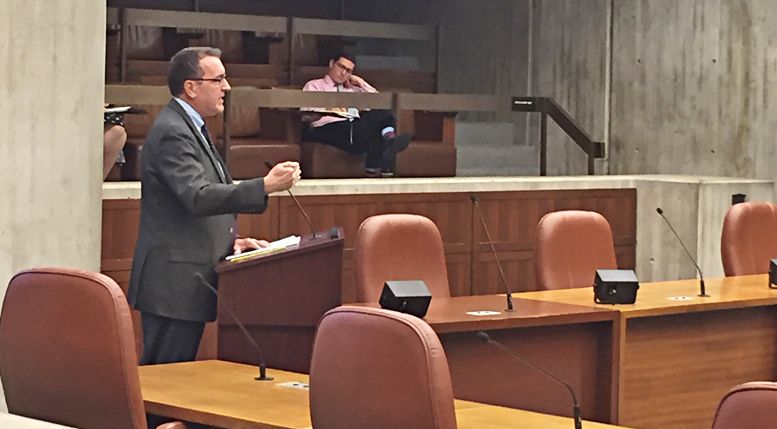In response to a report by The Fenway Institute released late last year finding that more than 15 percent of Boston’s LGBTQ youth of color had traded sex for money, food, shelter, or other resources, the Boston City Council’s Committee On Healthy Women, Families & Communities held a hearing September 27 on the needs of the city’s LGBTQ youth of color.
Called by District 8 Councilor Josh Zakim, the hearing drew approximately 35 attendees and featured testimony from youth, adults who work with youth, social scientists, academic experts, and officials from Boston Public Schools and the Boston Public Health Commission.
Kerith Conron, an Affiliated Investigator at The Fenway Institute, and the Blachford-Cooper Research Director and Distinguished Scholar at The Williams Institute at the UCLA School of Law, offered testimony from the report, titled, “Our Health Matters: Mental Health, Risk, And Resilience Among LGBTQ Youth Of Color Who Live, Work, Or Play In Boston.”
Key findings, said Conron, who co-authored the report along with Johannes Wilson, Sean Cahill, Jessica Flaherty, Mio Tamanaha, and Judith Bradford, included:
- Over 40 percent of a sample of LGBTQ youth of color in greater Boston reported symptoms of clinical depression and/or anxiety.
- Nearly one in five attempted suicide within the prior 12 months.
- One in five 19-25 year old youth reported exchanging sex for a place to sleep, money, food, drugs or other resources in the prior three months.
- Family rejection, bullying, and discrimination along multiple axes of inequality, coupled with a low minimum wage and a lack of affordable housing, are among the root causes of poor health for LGBTQ youth of color.
Zakim, along with other councilors in attendance including District 7 Councilor Tito Jackson, and Councilors-at-Large Ayanna Pressley and Michael Flaherty, expressed concern about the high number of young people exchanging sex for basic necessities.
Cahill, who is Director of Health Policy Research at The Fenway Institute, offered testimony on the high rates of HIV among young gay and bisexual men and transgender women. Citing recent data from the US Centers for Disease Control, Cahill noted that Black gay and bisexual men have a one in two lifetime chance of becoming HIV-infected, Latino gay and bisexual men a one in four chance, and White gay and bisexual men a one in 11 chance. He called for a sense of urgency to reduce these striking racial disparities among gay men.
Gary Bailey, MSW, ACSW, a Professor of Practice at Simmons College School of Social Work and at the Simmons School of Nursing and Health Sciences, testified to the mental health needs of LGBTQ youth and how critical it is for providers to be trained in the provision of cultural competent care. He also emphasized that school officials and healthcare providers needed to be aware of and address other issues that can exacerbate the mental and physical health needs of LGBTQ youth of color. “Those include racism, poverty, LGBTQ stigma, discrimination, victimization, mistrust of and harassment by police and minority stress,” he said.
Grace Sterling Stowell, executive director of the Boston Alliance of Gay, Lesbian, Bisexual, and Transgender Youth (BAGLY), testified to the importance of social supports that exist outside of school. Although many schools in Boston have Gay Straight Alliances for students, they are often overwhelming attended by white, female heterosexual allies who play an important role in creating a welcoming school social climate. But such groups are not necessarily reaching all LGBTQ youth, particularly young Black and Latino males attracted to other males.
Recommendations offered by expert testifiers included:
- providing culturally competent, nondiscriminatory health care to help reduce medical mistrust;
- providing comprehensive sexuality education and access to condoms and pre-exposure prophylaxis;
- finding ways to connect LGBTQ youth, particularly those in the public school system, with community-based resources such as BAGLY, Boston GLASS, and Youth on Fire, and restoring city and state funding cuts to these critical youth organizations;
- reporting from the Boston Public Schools on the health of LGBTQ students using data from its Youth Risk Behavior Survey;
- training for all schools and youth-serving staff in how to support LGBTQ youth and intervene if they witness bullying; and
- engaging young people in working for solutions to improve their own lives;
“Our Health Matters: Mental Health, Risk, And Resilience Among LGBTQ Youth Of Color Who Live, Work, Or Play In Boston,” is available online at this link: http://fenwayhealth.org/wp-content/uploads/our-health-matters.pdf.
[From a News Release]







